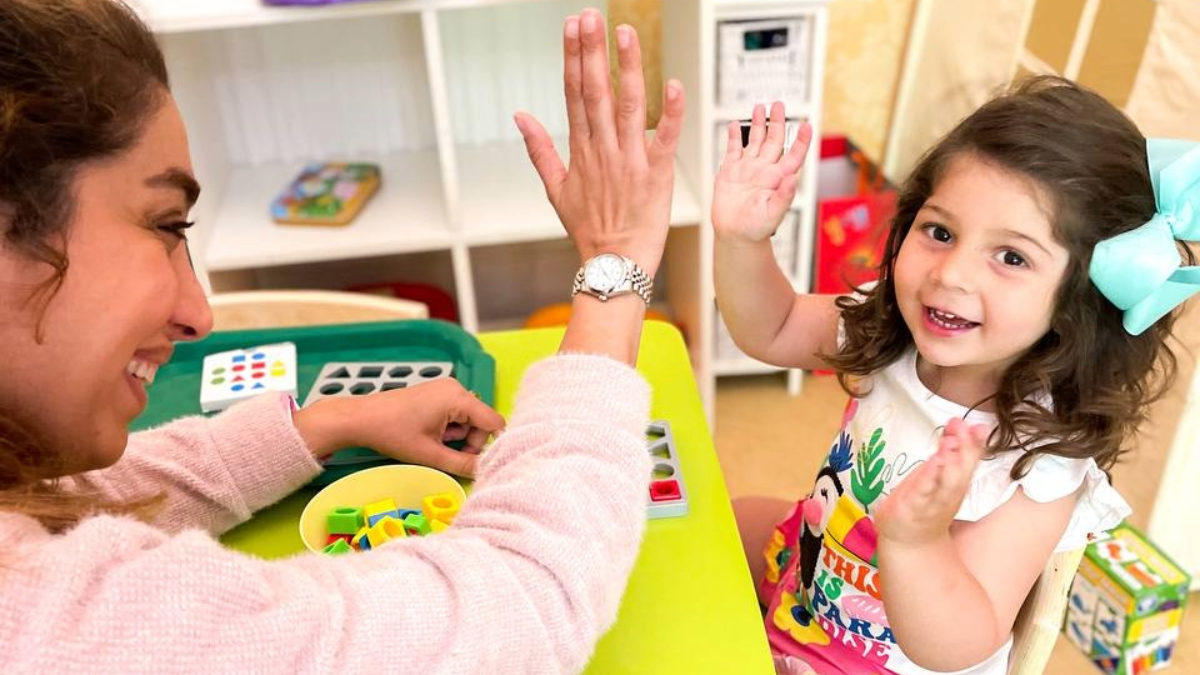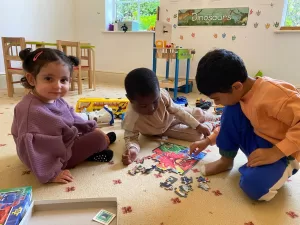The concept of play-based learning has revolutionised early childhood education, shedding light on the profound impact of play on a young child’s development. At Happy Chalet, we have embraced the essence of play-based learning, particularly in the context of our home-based nursery, and offer insights on how we have effectively integrated this approach to enrich the learning experiences of young children.
Understanding Play-Based Learning
At the heart of play-based learning lies the recognition of play as a natural and powerful learning tool. It’s not just about keeping children occupied; play is a serious business when it comes to early development! Through play-based learning, children explore their world, develop key skills and build their social, emotional and intellectual capabilities.
Play-based learning can support children who are finding it difficult to settle into nursery. Explore more on why a child might struggle with settling.
Types of Play and Their Benefits
1. Pretend Play: This form of play, which includes role-playing and imaginative scenarios, fosters creativity, problem-solving skills and empathy. Children learn to navigate social dynamics and develop language and storytelling skills.
2. Sensory Play: Activities involving touch, sight, sound, taste and smell help children understand their sensory experiences. This type of play is crucial for cognitive development, fine motor skills and discovering scientific concepts.
3. Physical Play: This involves activities that encourage movement, such as running, jumping and climbing. This form of play is vital for physical health, coordination and understanding spatial relationships.
Implementing Play-Based Learning in Home-Based Nurseries
Creating a nurturing environment at home can significantly enhance the play-based learning experience. Here are some strategies we’ve used at Happy Chalet to promote our play-based learning style:
1. Environment Setup: We make sure to designate a safe and inviting play area with diverse and age-appropriate resources for our young students. We also ensure that the space is flexible enough to accommodate various types of play activities.
2. Activity Integration: We blend educational objectives into playtime. For example, we use counting games for numeracy skills or storytelling for language development. The key here is to make learning seamless and fun, thereby engaging the students and helping them learn to the best of their ability.
3. Role of the Educator: As teachers, our role is to facilitate and guide rather than direct. This involves observing a child’s interests, participating in their play when invited and offering choices and challenges. To add to this, we also observe and learn about what suits each child best, as well as what doesn’t work well for them.
Also Read: Speech and Language Development Milestones in Early Years
Advantages of Play-Based Learning in Home Settings
Home-based nurseries offer a distinctive setting that is ideally suited for play-based learning, harnessing the power of a familiar and intimate environment. Unlike more structured or formal educational settings, home nurseries provide a warm and personal atmosphere where learning is naturally integrated into the child’s daily life. This setting enables a more tailored approach to education, where activities and play can be adapted to fit the individual needs, interests, and pace of each child.
In such an environment, children can explore and learn in a space where they feel secure and confident, allowing them to engage more deeply and meaningfully with play-based activities. The comfort of a home setting also means that learning and play can seamlessly blend throughout the day, rather than being confined to specific periods. This continuity fosters a consistent learning experience, where educational concepts and skills are reinforced in a variety of contexts, from structured playtime to spontaneous learning opportunities that arise during a regular day.
Also Read: Outdoor Play Benefits: Childcare Environment that Encourages Outdoor Activities
Moreover, parents and caregivers play a massive role in this learning process when they adopt this style at home as well. They are not just supervisors but active participants in the child’s play, which further enriches the learning experience and complements the efforts of the nursery. By engaging in play alongside the child, parents can also observe and better understand their child’s evolving interests and developmental needs, allowing them to guide their learning process more effectively. This close involvement also strengthens the emotional bond between the child and the caregiver, which is crucial for the child’s emotional and social development.
In Closing
Incorporating play-based learning into a home-based nursery like Happy Chalet is not just about giving children toys or designated playtime. It’s about creating an environment where play is the medium through which children learn about themselves, their peers and the world around them. Through thoughtful planning and understanding the dynamics of play, we offer tremendous developmental opportunities, paving the way for well-rounded, confident and curious young learners.






